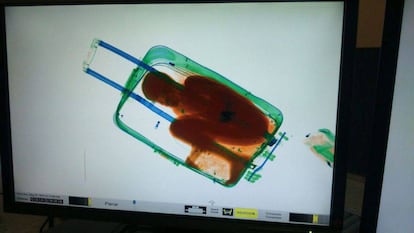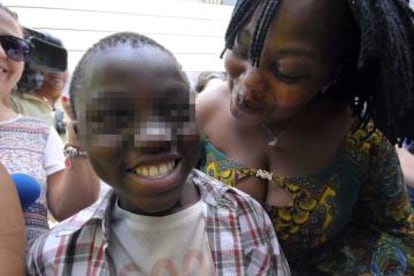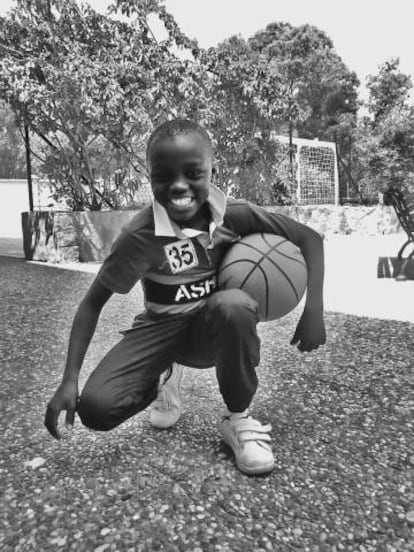What became of Adou, the suitcase boy?
Spanish journalist relates story of eight-year-old who showed up on scanning machine at border


His name was Adou, he was eight years old and he was packed in a suitcase in May 2015 to be smuggled across the Tarajal border crossing which separates Morocco from the Spanish exclave of Ceuta in North Africa.
What is wrong with Spanish law for people to have to resort to such desperate measures? Nicolás Castellano, journalist
The suitcase was in the hands of a 19-year-old Moroccan girl who hesitated before passing through the checkpoint, arousing suspicion. The police put the case through the scanner, producing a photo that shocked the world; Adou was in “a terrible state” according to a Guardia Civil spokesperson.
Now Nicolás Castellano, a journalist with Spain’s Cadena Ser radio station has turned the suitcase boy’s story into a book titled Me llamo Adou (My Name Is Adou).
Castellano narrates the odyssey of a family the Ivory Coast desperate to reunite after fleeing the poverty and violence of their West African homeland and argues that a “blunder” by the Spanish authorities was responsible for what happened to Adou, and that his father Ali was not to blame.
A French teacher, Ali was the first to leave the Ivory Coast and settle in Spain. He came illegally, on a boat that he and his traveling companions built themselves. The first attempt was unsuccessful, so he tried again and embarked on a journey that took him two years via Ghana, Burkino Faso, Mali, Senegal, Mauritania and Morocco, where he was not only arrested and assaulted but also fell ill.

Three years later, once Alí had established himself in Spain’s Canary Islands and had obtained his residence papers, he set about bringing his family over so that they could be together again. First he brought his wife, Lucie, then his nine-year-old daughter, Miriam, but Adou, his youngest, was refused entry. “As the Ombudsman’s Office pointed out, the authorities did not apply the law correctly as Adou’s parents met all the requirements,” says Castellano.
The authorities in Las Palmas rejected Adou’s application, alleging that Alí did not have enough money to support the whole family, despite the fact he could demonstrate he had a stable job and fixed abode in Spain. The discrepancy between his income and the official financial requirement was a question of €56 – a paltry sum, on top of which Castellano points out the same immigration law “asks that the economic requirements should be secondary to the interests of the child.” In Adou’s case, his grandmother who had been looking after him in the Ivory Coast had just died.
With legal entry blocked, Adou’s father took matters into his own hands and paid traffickers €5,000 to smuggle his son into Spain. “He does not regret trying to bring his son over, but he does regret trusting people who put his son’s life in danger,” say the journalist.
My dad wants me to be a doctor but I want to be a footballer like Messi Adou
Some of the police officers working that day at the Tarajal border crossing had been 20 years on the job and had never seen anything like it. “Hi. My name is Adou,” the child said in French when they opened the case. As he wore neither trousers nor shoes, one of the policemen bought him clothes and footwear en route to the police station.
Following DNA tests, Adou’s father was arrested. Adou’s mother found out her husband had been picked up by the police at the same time she heard the news her son had been found in a suitcase. Adou was placed in a youth detention center until his mother could come for him and Alí spent 32 days in jail. He is still to be tried for violating the rights of foreign nationals.
Blown asunder
The family was broken up again five months later. Adou became known as The Suitcase Boy and people would stop him in the street and ask to take photos. Eventually, Lucie and the children went to live in Paris with a distant relative to get away from the fuss. There, she was able to work and also receive state support of a kind unavailable to her in Spain.
Ali was the one to be left behind this time as his passport was confiscated to make sure he attended his trial which still had no date. He now lives in Bilbao, in the Basque country, where he has a handful of friends and does odd jobs. He would like to find work as a receptionist in a hotel. He believes he would be good at it because he speaks five languages.

In Paris, Adou prefers football to study and is said to be hyperactive. As his mother has little schooling, he calls his father in Bilbao to help him with his homework.
“He wants me to be a doctor,” Adou tells Castellano in the book. “But I want to be a footballer like Messi and play for Barcelona or for Paris Saint-Germain.”
Meanwhile, Lucie works sporadically as a carer and wonders from time to time if it was worth leaving their home in Ivory Coast.
“What we have to ask ourselves is what is going wrong with Spanish law for people to have to resort to such desperate measures to keep their families together,” says Castellano who believes that increasingly restrictive European guidelines are playing into the hands of the mafias.
“We are talking about this particular case because of a shocking photo, but thousands of families have lived through similar predicaments,” he adds.
English version by Heather Galloway.
Tu suscripción se está usando en otro dispositivo
¿Quieres añadir otro usuario a tu suscripción?
Si continúas leyendo en este dispositivo, no se podrá leer en el otro.
FlechaTu suscripción se está usando en otro dispositivo y solo puedes acceder a EL PAÍS desde un dispositivo a la vez.
Si quieres compartir tu cuenta, cambia tu suscripción a la modalidad Premium, así podrás añadir otro usuario. Cada uno accederá con su propia cuenta de email, lo que os permitirá personalizar vuestra experiencia en EL PAÍS.
¿Tienes una suscripción de empresa? Accede aquí para contratar más cuentas.
En el caso de no saber quién está usando tu cuenta, te recomendamos cambiar tu contraseña aquí.
Si decides continuar compartiendo tu cuenta, este mensaje se mostrará en tu dispositivo y en el de la otra persona que está usando tu cuenta de forma indefinida, afectando a tu experiencia de lectura. Puedes consultar aquí los términos y condiciones de la suscripción digital.








































